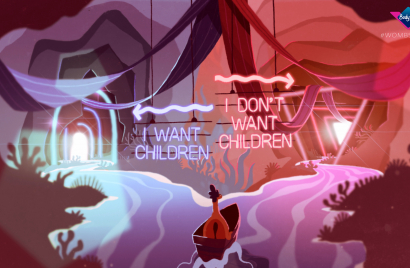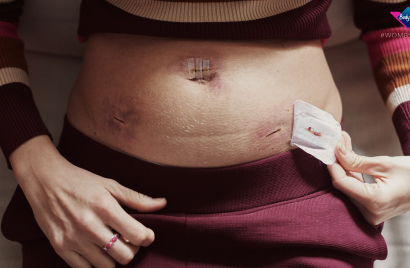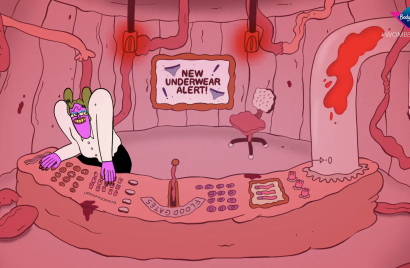
CoppaFeel brand refresh aims to reach a new generation
The charity has worked with Livity to encourage young people to check their chest

A ground-breaking new campaign marks a step-change for the depiction of the lived-experience of women in advertising.

From inexplicably happy roller-blading women in white shorts, to the unspecified science experts pouring an unknown blue liquid on sanitary towels as a proxy for menstrual blood; tampon and sanitary towel adverts have historically been the commercial pinnacle of society’s collective squeamishness with women’s bodies.
However, if in the past the advertising surrounding period products was the worst-excesses of one-dimensional gender stereotypes, Bodyform’s latest campaign could also be the tipping point, which finally ushers in a progressive and profoundly different narrative for women in advertising and beyond. ‘Groundbreaking’ may well be one of the most overused words in advertising but ‘Womb Stories’ created by AMV BBDO, marks a fundamental shift in the depiction of women’s bodies in advertising.
The campaign is a creative love letter to the unseen, unspoken and unknown stories of women’s wombs. The film spans understanding endometriosis, fertility treatment, menopause, periods, being childfree and experiencing miscarriage. Director Nisha Ganatra uses animation and film to weave together the emotional complexities of women’s bodies.
With #wombstories, Bodyform & Libresse are aiming to push back at what the team describe as “the single, simplistic narrative girls are taught from a young age”. A linear narrative arc which begins with starting your period in adolescence, repeat with ‘a bit’ of pain, want a baby, get pregnant, have more periods, stop periods and fade into the menopausal background.
The reality is, of course, much messier, but society doesn’t encourage women to talk openly about the highs and lows of their intimate health, especially in times of global uncertainty. Yet new research by Bodyform & Libresse found that two thirds of women who experienced miscarriage, endometriosis, fertility issues and menopause said that being open with family and friends helped them to cope. An honesty which literally brings the oxygen to the room of women's experience; not only empowering them to not feel alone in their experience, but to seek and demand medical attention when they need it.
We want to boldly go where no other brand has been before; inside women’s bodies and emotions to truly represent their sensations and feelings that we believe are not only invisible but ignored, overlooked or denied.
Nicola Coronado
The creative execution is so powerful because the voices of real women and their lived experience are the creative thread that knits this campaign together. Women from the #wombstories archive project describe their experiences of inhabiting a woman’s body. Their words form the foundation of the real stories on screen.
The experience of endometriosis, which was described as being like “a demon tearing its way out of my pelvis” and “an elephant wearing stilettos, stomping on my womb” comes to life authentically on screen. When you consider that 176 million women, one in 10, are affected by endometriosis worldwide, the silence that surrounds the impact on women’s bodies is profound.
In Invisible Women: Exposing Data Bias in a World Built for Men, the academic and author Caroline Criado-Perez powerfully sets out the cost of the silence that surrounds women’s bodies. In the UK it will take a woman on average seven and half years to be diagnosed with endometriosis. While 40% of women with endometriosis have to go to their GP ten times before being referred to a specialist.
Nicola Coronado, UK and Ireland Consumer Marketing Director at Bodyform, explains that with #wombstories the brand is starting “a movement” and it is this which has spearheaded the brand’s desire to accurately represent the lived experience of women.
She explains: “We want to boldly go where no other brand has been before; inside women’s bodies and emotions to truly represent their sensations and feelings that we believe are not only invisible but ignored, overlooked or denied. #wombstories reveals the narrative inside and out and we hope to put these topics on the table for all to talk about. We believe that only once we understand women’s bodies and everything they go through can we care for them with our period and daily intimate care products.”
The campaign brings the same empathy to new motherhood with a depiction that steadfastly rejects the ironed-out, pastel-tinged view of the experience so often leaned on by advertisers. As a new mother explained to the archive project: “Being a mother is a beautiful thing, we shouldn’t look at our stretch marks as something we’re ‘left with’, but something that we have earned.”


It is particularly poignant that this film comes out in the midst of the coronavirus crisis where there are additional challenges like for example, having to give birth without your birthing partner, or being able to access health support for endometriosis.
Tanja Grubner, FemCare Global Marketing & Communications Director at Essity, explains: “Although this campaign was conceived long before the pandemic changed everything, the issues women face didn’t just get put on hold or go away because of what was going on around us. In many instances, COVID-19 has increased the isolation women feel and the complexities they experience. The pandemic has seen women forced to give birth alone, have their fertility treatments and endometriosis surgeries delayed and postponed. Now more than ever is a time to ensure women speak up about their bodies and experiences.”
Although this campaign was conceived long before the pandemic changed everything, the issues women face didn’t just get put on hold or go away because of what was going on around us.
Tanja Grubner
There are few clearer commercial examples of the way in which cultural baggage holds women back than the stereotype of the rollerblading woman, somehow selling tampons. The blue liquid is a perhaps a metaphor for society’s collective inability to recognise women’s lived experience.
Stereotypes in advertising matter because they contribute to a culture in which women cannot realise their full potential. Nor even find the words to describe universal experiences such as the menopause.
With the Viva la Vulva campaign, AMV and Bodyform defined brand bravery with a joyful ode to Vulvas, and now with #wombstories the brand is taking the narrative to the next level. Nadja Lossgott, Executive Creative Director of AMV BBDO and Art Director on the campaign, explains: “Periods don’t just exist in isolation. They are connected to this entire ecosystem centred around our wombs, which almost acts as a second seat of power that rules us in such profound ways. We have this intensely complicated relationship with it. And yet this life-long bittersweet journey with our bodies is still considered something to shut up about.”
She continues: “By visualising and anthropomorphising our wombs, we can begin to open up an emotional and human way to express these often complicated, contradictory feelings of love and hate, of pain and pleasure, of the mundane and the profound we constantly deal with.”
For a film to so successfully encompass so many parts of women’s lives that have remained shrouded in shame is a powerful reminder of the ability of advertising to shift culture. It’s a step-change which leaves brands with a question too important to ignore: what if telling the truth about women’s bodies, rather than telling women what they should aspire to be, or what they should hide or silence, was the key to successful marketing to women?


**Research conducted by Essity Libresse in February 2020 with 8,121 people (4113 women and 4008 men) aged 18 – 55+ in the UK, France, Italy, Sweden, Russia, China, Argentina and Mexico. Of these people 5,632 were parents, 2,489 were not parents.
Looks like you need to create a Creativebrief account to perform this action.
Create account Sign inLooks like you need to create a Creativebrief account to perform this action.
Create account Sign in